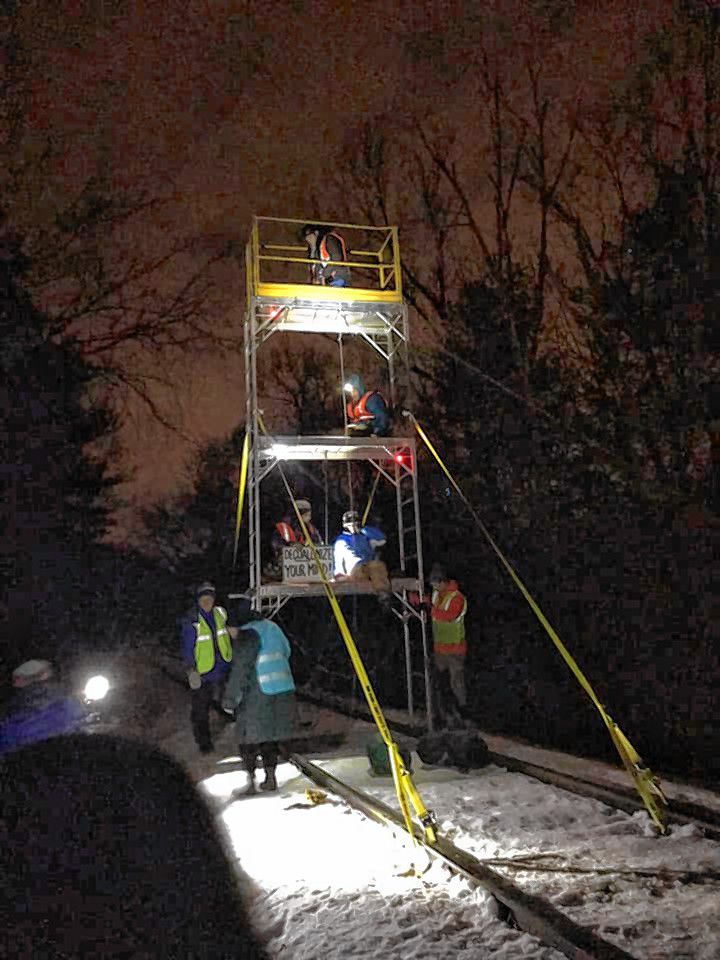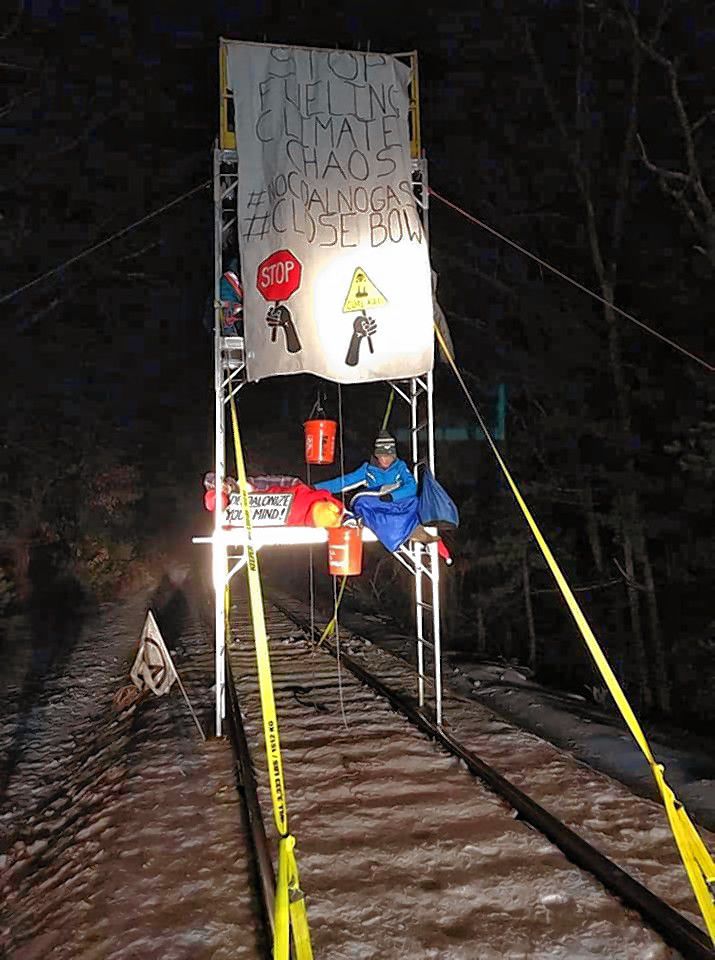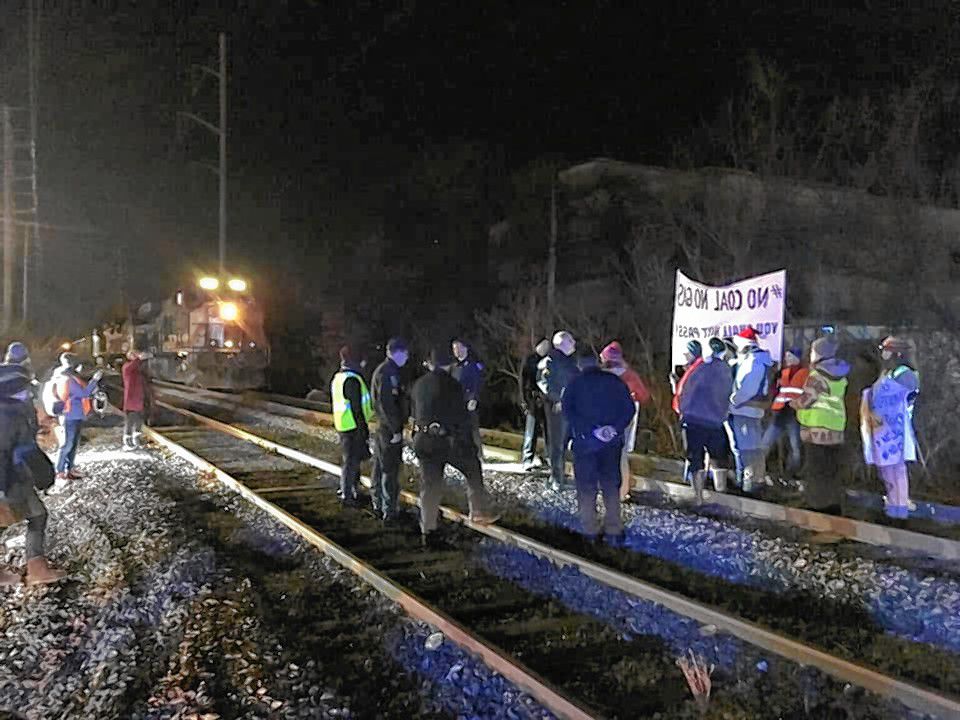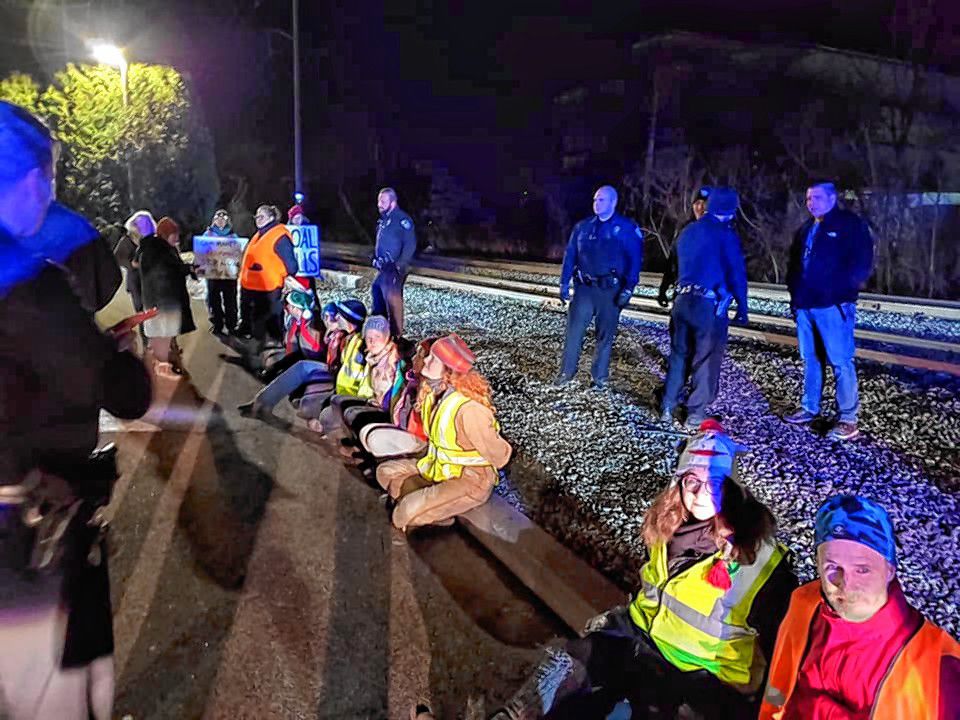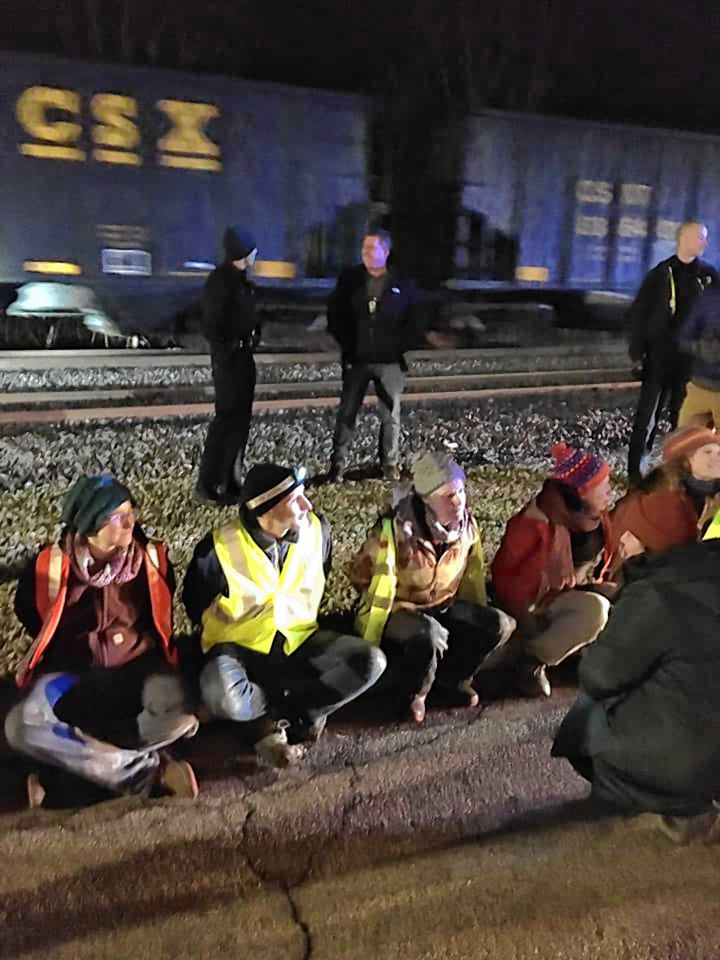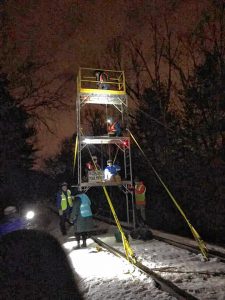In the early hours of Friday, January 3, a group of protesters — some from the Pioneer Valley — blocked a train carrying 10,000 tons of coal by erecting a three-tiered scaffold on tracks in the town of Harvard. They blocked the train for over nine hours after initially constructing the scaffolding on Thursday night.
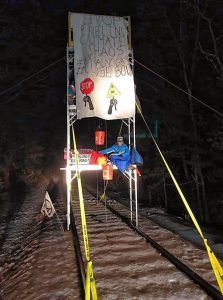
Members of the climate activist coalition No Coal, No Gas blocked a coal train from passing through the town of Harvard on Friday, January 3, for nine hours. Climate activists built a three-tier, 16-foot scaffold to delay the train as long as possible. Four activists out of nearly 30 were arrested by State Police. Courtesy photo
“We’ve had decades of advanced warnings that we need to stop burning coal,” said Portland, Maine, resident Jay O’Hara, a member of No Coal, No Gas, a coalition of climate activists which has set up five blockades of trains bound for Merrimack Generating Station in Bow, New Hampshire, which is among the last coal-fired plants in New England. Nearly 30 activists gathered about a mile into the woods in Harvard to stop the coal train.
“While there is a lot of good rhetoric from elected officials, change has not come to a transition to renewable electricity … Whatever rhetoric around a transition there is for climate goals, either from local or national politics, is meaningless if we aren’t changing this on the ground,” he said.
O’Hara drew national attention in May 2013 when he and another climate activist positioned a lobster boat called the “Henry David T” in between the Brayton Point Power Station in Somerset and a freighter with a 40,000-ton shipment of coal, blocking the delivery for a day. Charges of conspiracy, disturbing the peace and other violations were later either dropped or downgraded by then-Bristol County District Attorney Sam Sutter who was sympathetic toward their concerns on climate change.
Several months following O’Hara’s action, Energy Capital Partners, the company that owned Brayton Point Power Station, announced the plant would shut down by 2017. It shut down for good on May 31 that year.
According to State Police, the four activists who occupied the 16-foot scaffold in Harvard on Jan. 3 were arrested after they refused orders to disperse: Cody Pajic, 21, of Pembroke; Gia Neswald, 50, of Turners Falls; Adam Rice, 30, of South Portland, Maine; Timothy Dechristopher, 38, of Pawtucket, Rhode Island. The rest of the activists had their information taken by police and a coalition member said it was unclear what the repercussions would be for them.
Harvard firefighters eventually removed the people from the scaffolding without incident, according to a statement by Harvard Police Chief Ed Denmark. The four arrested were charged with trespassing, walking or standing on railroad tracks and obstruction of the passing of a train.
The latest blockade follows a series of actions aimed at shutting down the New Hampshire coal facility by No Coal, No Gas, a facility which is a 482-megawatt power plant using two coal-fueled and two-kerosene-fueled turbines, owned and operated by Granite Shore Power. The train had left Wana, West Virginia.
Granite Shore Power did not return a request for comment.
Coal makes up about 1 percent of electricity generated in New England, according to ISO New England, a not-for-profit corporation that works to ensure New England has electricity. The main sources of electricity generated in New England are natural gas at 49 percent, nuclear at 30 percent, and renewables at 10.4 percent, according to ISO New England.
“The idea was to use the scaffolding to basically block the train for a longer period of time than previous” actions, said Laura Stamas, a Brattleboro resident who took part in the blockade in Harvard. Although she said she knew getting arrested was a possibility, State Police “were vague about the consequences. We’re not sure if we are going to court or will have to pay a fine or if there are no repercussions.”
No Coal, No Gas is made up of several climate activist groups including the Climate Disobedience Center, 350 Vermont, 350 New Hampshire, 350 Mass Action and Extinction Rebellion. O’Hara is also a co-founder of the Climate Disobedience Center, which “exists to support a growing community of climate dissidents,” according to the group’s website.
“The station needs to be shut down,” O’Hara said. “The goal is to build a movement capable of doing that.”

On Saturday, December 28, climate activists blocked a train in Worcester heading to the Merrimack Generating Station in Bow, New Hampshire. Ten activists out of nearly two dozen were arrested that night. Courtesy photo
On Saturday, December 28, climate activists blocked a train in Worcester headed for the Merrimack Generating Station. As a result, 10 people out of nearly two dozen activists were arrested on charges of disorderly conduct, and all pled not guilty at their arraignments on Dec. 28 in Worcester District Court.
Activists were able to get the train to stop shortly before 8 p.m. The Worcester Police Department and Boston & Maine Railroad Police responded swiftly and made their arrests shortly after arriving. By 8:15 p.m. the train began rolling again, according to O’Hara.
“There is a lot of agreement that it’s time to have actions meet the scale of the (climate) crisis and the crisis we are in is massive and it’s very present now,” said Abigail Mnookin of Brattleboro, who was arrested for participating in the blockade and spent a portion of the night in jail. “It’s not a future crisis. It’s taking action now to the scale of that in a peaceful and non-violent way.”
Coal gets delivered much less frequently to the generating station in Bow compared to a decade ago, according to O’Hara. In the past, coal would get delivered on a weekly basis to the facility. Now coal is delivered once a year during December, and by stopping the train and drawing public attention to this generating station, O’Hara said the coalition’s goal is to shut down the facility for good.
The blockades in Harvard and Worcester are the latest in a string of actions taken by No Coal, No Gas since September. Nearly 70 out of 120 activists were arrested during a demonstration at the coal plant in Bow at the end of September where activists called for its closing. The activists were arrested for walking onto the grounds of the plant by following train tracks.
Since the demonstration outside the Bow facility, No Coal, No Gas has organized three train blockades prior to the one on Dec. 28 in Worcester; one in West Boylston; one in Ayer; and Hooksett, New Hampshire.
According to No Coal, No Gas, the Merrimack coal facility is the “last major coal-fired power plant in New England without a shutdown date.”
“It’s fallen to us as citizens, as conscious humans, to try to put a stop to this,” O’Hara said. “If they keep sending trains, we will be ready for them when they come.”
Luis Fieldman can be reached at lfieldman@valleyadvocate.com.

